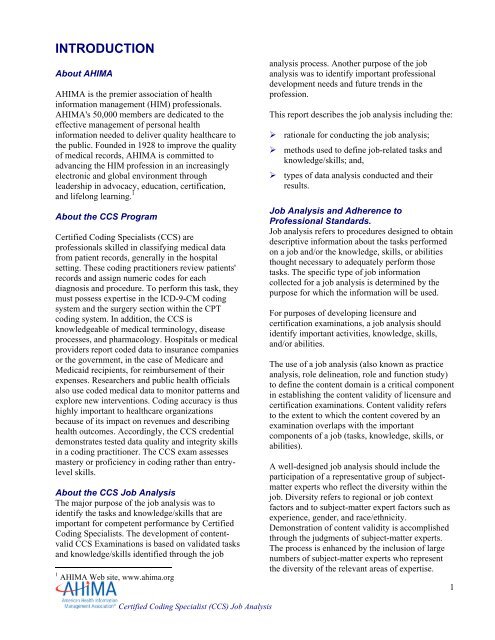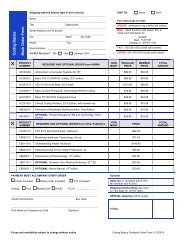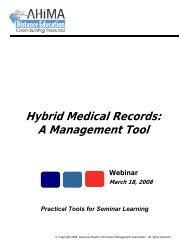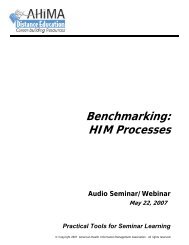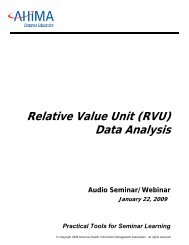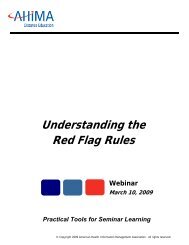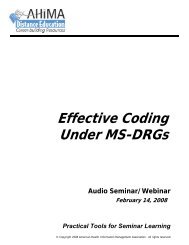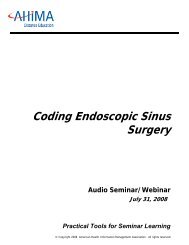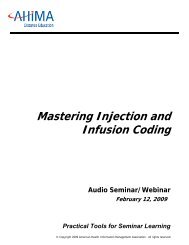Certified Coding Specialist (CCS) JOB ANALYSIS American Health ...
Certified Coding Specialist (CCS) JOB ANALYSIS American Health ...
Certified Coding Specialist (CCS) JOB ANALYSIS American Health ...
You also want an ePaper? Increase the reach of your titles
YUMPU automatically turns print PDFs into web optimized ePapers that Google loves.
INTRODUCTION<br />
About AHIMA<br />
AHIMA is the premier association of health<br />
information management (HIM) professionals.<br />
AHIMA's 50,000 members are dedicated to the<br />
effective management of personal health<br />
information needed to deliver quality healthcare to<br />
the public. Founded in 1928 to improve the quality<br />
of medical records, AHIMA is committed to<br />
advancing the HIM profession in an increasingly<br />
electronic and global environment through<br />
leadership in advocacy, education, certification,<br />
and lifelong learning. 1<br />
About the <strong>CCS</strong> Program<br />
<strong>Certified</strong> <strong>Coding</strong> <strong>Specialist</strong>s (<strong>CCS</strong>) are<br />
professionals skilled in classifying medical data<br />
from patient records, generally in the hospital<br />
setting. These coding practitioners review patients'<br />
records and assign numeric codes for each<br />
diagnosis and procedure. To perform this task, they<br />
must possess expertise in the ICD-9-CM coding<br />
system and the surgery section within the CPT<br />
coding system. In addition, the <strong>CCS</strong> is<br />
knowledgeable of medical terminology, disease<br />
processes, and pharmacology. Hospitals or medical<br />
providers report coded data to insurance companies<br />
or the government, in the case of Medicare and<br />
Medicaid recipients, for reimbursement of their<br />
expenses. Researchers and public health officials<br />
also use coded medical data to monitor patterns and<br />
explore new interventions. <strong>Coding</strong> accuracy is thus<br />
highly important to healthcare organizations<br />
because of its impact on revenues and describing<br />
health outcomes. Accordingly, the <strong>CCS</strong> credential<br />
demonstrates tested data quality and integrity skills<br />
in a coding practitioner. The <strong>CCS</strong> exam assesses<br />
mastery or proficiency in coding rather than entrylevel<br />
skills.<br />
About the <strong>CCS</strong> Job Analysis<br />
The major purpose of the job analysis was to<br />
identify the tasks and knowledge/skills that are<br />
important for competent performance by <strong>Certified</strong><br />
<strong>Coding</strong> <strong>Specialist</strong>s. The development of contentvalid<br />
<strong>CCS</strong> Examinations is based on validated tasks<br />
and knowledge/skills identified through the job<br />
1 AHIMA Web site, www.ahima.org<br />
<strong>Certified</strong> <strong>Coding</strong> <strong>Specialist</strong> (<strong>CCS</strong>) Job Analysis<br />
analysis process. Another purpose of the job<br />
analysis was to identify important professional<br />
development needs and future trends in the<br />
profession.<br />
This report describes the job analysis including the:<br />
rationale for conducting the job analysis;<br />
methods used to define job-related tasks and<br />
knowledge/skills; and,<br />
types of data analysis conducted and their<br />
results.<br />
Job Analysis and Adherence to<br />
Professional Standards.<br />
Job analysis refers to procedures designed to obtain<br />
descriptive information about the tasks performed<br />
on a job and/or the knowledge, skills, or abilities<br />
thought necessary to adequately perform those<br />
tasks. The specific type of job information<br />
collected for a job analysis is determined by the<br />
purpose for which the information will be used.<br />
For purposes of developing licensure and<br />
certification examinations, a job analysis should<br />
identify important activities, knowledge, skills,<br />
and/or abilities.<br />
The use of a job analysis (also known as practice<br />
analysis, role delineation, role and function study)<br />
to define the content domain is a critical component<br />
in establishing the content validity of licensure and<br />
certification examinations. Content validity refers<br />
to the extent to which the content covered by an<br />
examination overlaps with the important<br />
components of a job (tasks, knowledge, skills, or<br />
abilities).<br />
A well-designed job analysis should include the<br />
participation of a representative group of subjectmatter<br />
experts who reflect the diversity within the<br />
job. Diversity refers to regional or job context<br />
factors and to subject-matter expert factors such as<br />
experience, gender, and race/ethnicity.<br />
Demonstration of content validity is accomplished<br />
through the judgments of subject-matter experts.<br />
The process is enhanced by the inclusion of large<br />
numbers of subject-matter experts who represent<br />
the diversity of the relevant areas of expertise.<br />
1


